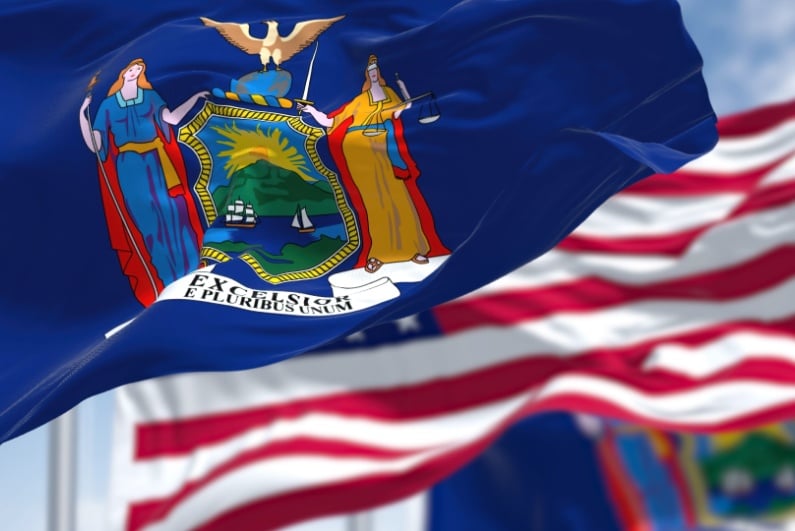Globally, the gambling sector experienced many ups and downs throughout 2018.
There were plenty of positive stories that provide great hope for those in the industry. Then there were other stories that were a cause of concern and worry for many who make their livelihood in the sector.
It is always worth looking back on the previous year to see how far the space has come. This allows you to reflect and digest these changes and to better predict what the coming year may hold.
With technology evolving at a rapid rate, changes in industries is a constant reality. If you do not keep up with the latest news and trends, then you are at risk of getting left behind in the space.
Here are the biggest stories in the gambling world in 2018.
US legalizes sports betting
Perhaps the biggest story of the year was the legalization of sports betting in the United States.
New Jersey had fought for many years to try and end the federal ban on sports betting, which was enacted in 1992 and was a cause of strife for many years. The Supreme Court was the last port of call for New Jersey in trying to get the ban overturned.
Thankfully, SCOTUS gave the green light for the ending of the federal ban following a vote of 6-3 in favour of legalization. The vote took place in May.
Each individual state now has the ability to legalize sports betting in their jurisdiction if they wish to do so. This also means that the responsibility of overseeing and regulating the sector is on the state authorities.
More recently, there have been calls to bring in a federal sports betting framework. A number of proposed bills are under consideration, but it looks unlikely that this will come to fruition.
So far, eight states are operating sportsbooks following the ending of the ban. These are Nevada, Delaware, West Virginia, Mississippi, New Jersey, New Mexico, Pennsylvania and Rhode Island. Many other states are considering sports betting bills and will be looking to make sports betting legal during 2019.
Those eight states have been seeing decent results month to month for sports betting, with intakes increasing month on month for the most part. New Jersey, in particular, has been seeing more success with its mobile sports betting offering than sportsbooks at physical locations.
This is why many states are looking to expand into also offering mobile sports betting.
The legalization of sports betting will be a major trend throughout 2019.
Countless different potential stakeholders stand to benefit from legal sports betting in the US. This includes gambling operators such as William Hill and Paddy Power, which are looking to capitalize on this burgeoning market.
The major sports leagues and teams are also looking to get in on the action. While the sports leagues for many years battled in the courts to stop the federal ban being overturned, they are now embracing legalization.
Many of the leagues have signed official deals with gaming partners. They are also looking to license their official data to operators, with all of these new revenue sources set to make their operations a lot more profitable going forward.
Fight against gambling advertising
Another major trend seen in the gambling space in 2018 has been the curtailment of the ways in which sports betting operators can advertise their offerings. Across the world, the number of problem gamblers continues to rise.
This is a cause of concern and something that the authorities are trying to urgently address. One of the key areas they are focusing on is the way in which these operators advertise. A lot of the time, with sports betting in particular, young people are being targeted everywhere they look.
They are facing pro-gambling advertisements during television ad breaks, during sponsored shows, on the kits of their favourite teams and players, on billboards at the stadium and through constant email marketing.
Young people are especially at risk because they are particularly impressionable. Seeing their favourite players promoting sports betting normalizes gambling in their minds and makes it appear that daily gambling is a normal activity.
Changes are being made around the world to curtail such advertising practices. In Italy, a new coalition government came to power at the start of 2018. It is anti-gambling and one of their first big changes was to bring in a blanket ban on gambling advertising. This means that companies cannot target Italian residents with any gambling advertisements.
The ban also extends to gambling sponsorships for sporting teams, players and events. As this is a major source of income for these groups, it is causing concern for them as they need to find the revenue elsewhere. More than half of the football teams in the Premier League and the Championship in England, for example, have gambling companies as their kit sponsors.
In Australia and the UK, there are now curtailments on gambling advertisements being shown on television during live sports events before 9pm. This is a stepping stone for further restrictions down the line.
Gambling companies, of course, are fighting back on this front as they will struggle to stand out from their competitors if they are not allowed to advertise their offerings. This will be an interesting space to watch going into 2019.
Another big move in the UK is limiting the stakes a player can have on addictive fixed odds betting terminals, to help with problem gambling.
While this will significantly decrease the operators’ gambling revenues and in turn lead to a shortfall in tax revenues for the government, it is a necessary move as it has been a major cause of problem gambling.
Crackdowns on gambling regulation breaches
Gambling regulators, particularly in Europe, cracked down in 2018 on companies breaching their rules. In the past, many breaches were let slide or not heavily punished. However, the authorities are now taking a tougher stance on these matters.
Regulators handed down a number of significant fines. For example, a financial penalty of more than £7m was imposed on Daub Alderney, there was a £5.85m fine for Casumo and a £1m fine for Videoslots. Most of these fines were for failures to properly implement the necessary anti-money laundering requirements, in addition to failing to protect problem gamblers.
William Hill is facing a £6.2m fine for similar reasons, with SkyBet receiving a fine of £1m for allowing those in their self-exclusion scheme to open further gambling accounts.
The reputation of the gambling sector has been sullied in recent years because it has been beset by many scandals. A lot of people feel that the gambling operators try to take as much as they can get and often cross the line to do so.
It is clear that the authorities want to clean up the poor reputation the industry has and come down hard on errant operators. These significant fines will act as a serious deterrent to these companies from commiting similar offences in the future.
Expansionary gambling policies
A number of states and countries expanded their gambling laws during 2018.
One of the major moves was Japan legalizing casino resorts for the first time. This is a potentially lucrative market. While it took more than 15 years of debates for Japan to legalize casinos, it was a lot quicker to legalize casino resorts.
A total of three different casino resort licenses are up for grabs, and each license could bring in a much as $10bn in revenues for the casino group each year. This move is likely to take a lot of business away from the previous gambling stronghold in Asia of Macau.
A significant bidding war is taking place as the majority of the major casino companies in the world want a piece of the Japanese action. The likes of MGM Resorts International are willing to invest as much as $10bn in building the casino resort if they get a license.
Greece is another country that is now embracing casino resorts. A major casino resort is to be built just outside of Athens. An investment of more than $8bn is needed for this project and it is expected to be a massive destination for tourists every year.
The bidding process has begun, with many of the leasing operators involved. It could even end up being a joint project between a number of gambling operators. Greece has also opened up its online gambling space by releasing official licenses for the first time.
Across the United States, a number of states are looking at legalizing casinos. This is particularly the case in states that previously were very conservative when it came to gambling. The potential state revenues often outweigh the perceived disadvantages of opening up these laws.
In 2019, many more states are likely to expand their gambling policies as they continue to see just how much money can be made through embracing the sector. The subsequent tax funds can be used for a myriad of good causes to mitigate any damage from new laws.
Conclusion
There was a clear trend of more expansionary gambling policies been taken up in the United States and Japan. However, authorities are attempting to expand in the right way and to protect consumers at the same time.
Regulators and authorities have never been stricter. With the privacy of data being so important in this day and age and the focus on problem gambling never brighter, there is a large onus on them to ensure that the sector does not get out of hand.
It was a largely positive year for the gambling space in 2018 and most experts envisage 2019 taking on a similar trajectory.




